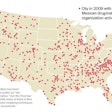Black slang has always had its roots in music. In the Jazz and Swing era of the 1920s-'40s, it was known as "hep talk." Many of the terms were code words for sex, drugs and gambling such as "ace, duce or trey" for the numbers one, two, and three; "reefer" for marijuana; and "rock and roll" for sex.
When I became a cop, I was more familiar with the African-American gang lifestyle than the Hispanic gang lifestyle. My ethnic and cultural background is Mexican American, but I grew up in a primarily black neighborhood. I graduated from Compton High in 1965. It was a very tumultuous period in that community. In August of that year, Los Angeles exploded in violent racial rioting.
As a result, I was fairly fluent in ghetto slang. In the late 1970s, I was a patrol training Oofficer in the Lynwood-Compton area. At one point, I was given a new trainee who was African-American. My trainee was a smart student. He had been raised in a more affluent part of Inglewood, a million miles culturally from Compton and Willowbrook. He spoke proper English.
Often, when we would arrive at a radio call or a crime scene, the local Compton citizens would approach my trainee first, excitedly trying to tell him what had just happened. My poor trainee had great difficulty understanding what they were saying when they began speaking gang slang. I often had to translate their slang into common English so he could write his police report. Most disturbing to him was the prolific use of the "N" word in almost every conversation. This was highly offensive to my trainee.
Even the user's speech patterns would change when using ghetto slang. The shortening or truncating of words and the slurring and running words together in rhythmic meter added to the difficulty of the unfamiliar vocabulary.
In Compton, "rap" is what young black men did to sweet-talk a young African American female, and to solicit cooperation and romantic interest from her. After its adaption into white American slang, it became slang for talking to anyone about anything. With the evolution of hip hop, the term "rap" was recaptured and used to label what we now know as Rap music. This Rap often expresses the culture and political commentary of urban life in musical rhythm and rhyme.
Later the hip hop culture also influenced the gang slang lexicon. I'm surprised that many of the old slang words remain in use but are used in new ways. Many of these original slang words born in the black culture were hijacked by the general American culture.
More recently, Snoop Dogg has made popular another African-American slang through his inclusion of some lines in his gangsta rap. "F'shizzle my n'izzle" is izzle slang talk for "fo' sho' my Nigga!" Like Pig Latin, it is a corruption of English to confuse the uninitiated listener. The izzle suffix is added following the first consonant of a word. Long before Snoop Dogg used this, it was slang language practiced in the ghetto. "Shizzle up, mizzle fizzle!" (Shut up, mother f---er!") I still can't do it well, even after several impromptu classes given by friends.
There are several good black gang slang dictionaries out there authored by gang cops and prison staff. You can even use urban dictionaries on the internet to translate slang. But the most current slang will be in use in Rap lyrics and among the gangsters themselves.
More radical influences like the Black Guerrilla Family (BGF) prison gang, the Black Panther Party, the African National Organization (ANO) and the Nation of Islam (NOI) use radical racial rhetoric to recruit members. They preach the myth that the African race is a super race. They encourage a rejection of the white culture and religion that "enslaved" them. They preach a return to their African warrior tribal roots.
However, any African-American who has travelled in Africa can tell you that the majority of those that currently live there have very little "love" for their black American brothers. And long before the Dutch and other European nations began buying slaves, African warrior tribes practiced slavery for many centuries.
A return to the African old religions is also encouraged and taught. This is done despite the fact that historically the African tribes were converted to Islam, not by missionaries, but by the sword. These Muslim nations also practiced slavery and provided a market for the slave trade.
In returning to the African roots, the racist recruiters often teach languages used by these Muslim countries. As a result, you often hear the greeting "As-Salaam Alaikum" (peace be upon you) and the response "Wa-Alaikum Salaam" (and unto you be peace) exchanged between re-educated African Americans.
This version of an Arabic greeting can be found in Malcolm X's autobiography. Catholics might recognize a similar greeting in its Latin form "Dominus vorbiscum" (The Lord be with you) and the response "Et cum spiritu tou" (and with your spirit), or in the Jewish faith the greeting Shalom.
In prison, forms of black slang and African languages are used to code conversations to prevent non-black inmates and staff from understanding the communication. These languages are taught to gang members who carry these back out into the community. They also serve as a racial recruiting tool. One of the favorite forms is the African Swahili tribal dialect.
For a sampling of Swahili terms you may hear in lock-up, view our primer, "A Swahili Dictionary."
















